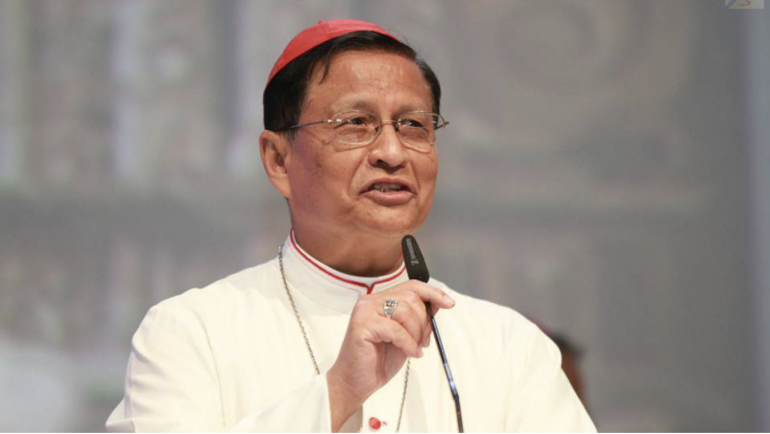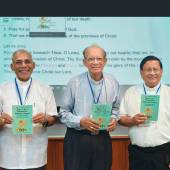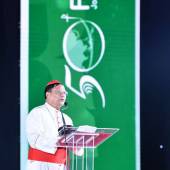Living a crisis with hope

Cardinal Charles Maung Bo
The COVID-19 pandemic around the world is now a "perfect storm." It challenges our ways of living, working and celebrating. The impact in Myanmar until now has been slower in coming, but that may only mean it will last longer.
Country by country the impact has differed depending on geography, border controls, government leadership and decisions, and preparedness of public health systems. These are testing times for all. In every case the worst affected are those who cannot socially isolate, who do not have water to wash, who have lost their jobs and so have no daily income, who return to their country as unemployed, hungry migrant workers, who do not have a government that looks out for them. For many the priority is to "flatten the curve" of hunger.
I want to encourage all to live this time fruitfully, generously, and with hope. Let us look out for one another. I join in the appeal of religious leaders to believers in God worldwide, to set aside "a day for fasting, prayers and supplications" next week on 14 May.
In most countries of Asia we live now under restrictions. Schools are closed, factories are closed, markets are running out of stock, travel is forbidden. Yet with unbelievable, obscene folly, conflicts continue. Military commanders of government and ethnic armies, as if they believe that their weapons are more powerful than this virus, continue to expose their soldiers, continuously endanger civilians, and risk a conflagration of contagion among the people of their nations.
Many people ask "when will all this end so that we return to normal?" The answer to the question "when will this end?" is never. It will not end, not just in the sense that things will never be the same again, which they won’t. But in the sense that what we do now will remain.
Asia has lived through many never ending conflicts, wars and crises, the Tsunami, Cyclone Nargis, and frequent, devastating typhoons. We know that each crisis left us changed. This time every country in the world is affected. It will leave our world profoundly changed. Politics will change. International relations will be different.
A catastrophe that hits over 200 countries changes the world. It’s like a world war. Even if COVID-19 can be contained within a few months, the legacy will live with us for decades. It will affect how we see and understand community, it will change how we connect, how we travel, how we construct our relationships. If governments do not meet the challenge they will lose the trust of their people.
In a crisis we see leadership at work. The experts say that key elements of good leadership in crisis are: direction giving, meaning making and empathy. A good leader offers a transparent framework for making decisions, makes sense of what is happening, understands how people feel, and so creates trust. A good leader persuades the collective to take collective responsibility in order to approach collective challenges. Good leaders protect the weak and model inclusiveness, quickly banishing any racism or division. A good leader takes special care of the at-risk communities. A good leader builds community and activates the antibodies against fear, anxiety and dislike.
A well-informed people is more effective and powerful than an ignorant people. People deserve to know the facts. Countries with honest reporting are earning the willing cooperation of well-informed publics. The gravest epidemic we face is the erosion of trust. In a crisis like this the real leaders use their opportunities to build trust.
Nation building does not simply occur in our capital cities and decision makers. Building the nation begins with listening to and accompanying people on the edges of society. It involves building up everyone. All have a role.
The world was full of serious problems before coronavirus. Inequality was rampant, between and within nations. The poor will suffer disproportionately in this crisis, the slum dwellers, the day labourers, the returning migrant workers. People on the periphery of society have long been neglected.
We now face an epochal change characterized by fear, xenophobia, and racism. Populist leaders arise in many countries today. The antidote to populism lies in the efforts of organized citizens who are ready to promote the experience of the “we” over the cult of the self.
Many decisions and practices adopted in a time of crisis become permanent. That applies to the way governments decide their priorities and it applies to small things at home. How you behave now, the steps you take now, will stay with you through your life. Your way of living as families, the way you face or avoid your neighbours, the way you have fun and the way you rest. These will stick. You will find that you have, you are having, an enduring shift of consciousness. It applies to how we see and relate to our world. There is no return to business as usual. Our lives will not resume as if this never happened. The question to ask ourselves is "what sort of world do we want when the storm passes?"
The absence of social connection makes us more ardent for it. Why did we allow so much division in the world? Why has such conflict been allowed to consume Myanmar for so many decades? Why are parts of the Philippines and Asia subjected to such dispute? Why do we have in Asia the longest running wars in the world? Looking at our histories until now, let us ask why were stronger bonds not built when we had the chance? Why do millions have to migrate abroad, just to be able to live? Now, losing their jobs abroad, they trickle home by the thousands, back to the villages that they left in despair. Going forward from here, can we build an economy that has a place for all, that puts people first? Can we have a solidarity that is tenacious? A desire for the common good that is grounded in respect?
We enter isolation and stay home for the sake of the common good. We go inside, but we must look outside. This is a time for patience, energy and intelligence. Patience is learned by practising it. This is a time for wisely organising our lives and energies; a time for stretching our imagination and intelligence; to learn in new ways; and to prepare for a new world. It is a time to realise how we depend on one another and to learn to work collectively and cooperatively, sharing responsibilities and appreciating solidarity. Above all, this is a time to put hatred and weapons aside and face the common enemy that is attacking all humanity.
Nothing has affected the whole world as radically as this virus. But do not put your lives on hold. The pandemic offers us time to go inside, but it gives us also time to be aware of others, to encourage one another, a time for solidarity with vulnerable people, and a time to pray to understand what is happening in our world. Welcome each day for its freshness. Don’t just wait for all this to be over. Use this time creatively.
Year after year in global surveys, Myanmar citizens are listed among the most generous people in the world. Not because they give more, but because more people in Myanmar give to others. This is evident in our current crisis. Even when we suffer hardship, the generosity of people is manifest. Many international aid workers may have left, but the local non-government organisations are coming into their own, volunteers, selflessly ready to channel basic needs to those in distress.
Across Asia, many people are now hurt, physically, emotionally, financially and spiritually. With its national response to the COVID-19 pandemic led by KMSS, the Catholic Church of Myanmar joins this movement of generosity that is typical of our country. We reach out to support others. Neighbours and ward authorities have an eye out for those who may not have enough to eat. This is a time to take to our world the goodness, mercy and love of God.
In any crisis there is a natural temptation to wait it out. But solutions won’t reveal themselves by waiting. As Amartya Sen and many others have said, a better society can emerge from this time of isolation. Don’t just sit down on your hands and wait. Don’t deny reality. We must be proactive. Start moving. Take advantage of this time to find and live the rhythms and relationships that you want to characterise our future. Imagine and prepare for a changed world. Build working relationships of trust that will stand by you for decades to come.
Arundhati Roy says that COVID-19 is a "portal," a doorway, that it is a moment of rupture between the old times and the new, from a world where a few are privileged and many neglected, to a changed world where the dignity of every human person is recognised. Are you preparing to pass through to that world?
Cardinal Charles Maung Bo of Yangon is president of the Federation of Asian Bishops’ Conferences
Radio Veritas Asia (RVA), a media platform of the Catholic Church, aims to share Christ. RVA started in 1969 as a continental Catholic radio station to serve Asian countries in their respective local language, thus earning the tag “the Voice of Asian Christianity.” Responding to the emerging context, RVA embraced media platforms to connect with the global Asian audience via its 21 language websites and various social media platforms.














